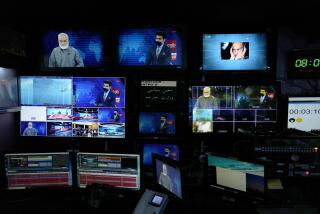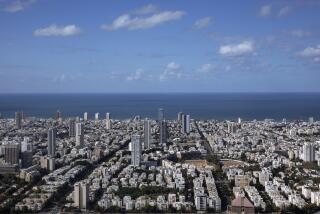S. Africa Imposes Severe Limits on Coverage of Riots
- Share via
JOHANNESBURG, South Africa — Severe controls were imposed Saturday by the South African government on news coverage of the country’s continuing unrest, provoking widespread criticism about the further reduction of press freedom and the public’s access to news here.
Louis le Grange, the minister of law and order, issued a decree prohibiting television and photographic news coverage of all anti-apartheid riots and protests in areas of the country now under a state of emergency that gives the police virtual martial-law powers.
Calling the presence of South African and foreign journalists “a catalyst to further violence,” Le Grange also said newspaper reporters, if permitted to cover unrest, must have police escorts and follow police instructions.
“While the government has no intention of curtailing the right of the public to be informed of current events,” Le Grange said, “it has decided to curb the presence of television and other audio-visual equipment during unrest situations in emergency areas.”
The effect of the government action, which followed extensive recent criticism here of foreign coverage of unrest, will be to remove from the world’s newspapers and television screens pictures of South African police and soldiers shooting and beating blacks.
To many South Africans, whites as well as blacks, the move was evidence of the deepening crisis in which the minority white regime finds itself--unable to halt the violence, which has now taken more than 800 lives in 14 months, unwilling to move ahead faster on political, economic and social reforms and unyielding to domestic and foreign pressures for compromise.
The government believes that curtailing news coverage of the unrest, which many fear is pulling the country into a racial civil war, will help reduce the level of violence by depriving militants of much of their domestic and foreign support, according to senior South African newsmen who were briefed on the restrictions.
‘Rather Simple-Minded’
“Their rationale is simple and, I am afraid, rather simple-minded,” the editor of a major South African newspaper said Saturday, asking not to be quoted by name. “They believe that if those awful pictures of policemen beating little children and old women and shooting down kids on the way to the store are no longer published or televised here and abroad, then the outside world will forget about the situation here, and that the blacks, without this backing, will stop fighting apartheid. This flies in the face of all logic and ignores the real causes for the unrest.”
Helen Suzman, a longtime opponent of apartheid and a member of Parliament from the liberal white opposition Progressive Federal Party, called the new restrictions “a very drastic curtailment of what still remains of our civil liberties” and warned that the effect may be to spread unrest from outlying black townships into the cities.
“If the media cannot see what is going on in the townships and convey this to their readers and viewers,” she said, “then maybe some blacks will say, ‘We will give them a taste of it right in the center of the city.’ I hope I am wrong.”
Blacks fear that, without cameras to record their actions, the police will become increasingly brutal.
‘Darkest Period’
Percy Qoboza, editor of City Press, a weekly newspaper for blacks, wrote in an editorial that, with the increased restrictions on the press, South Africa is entering “what is probably the darkest period since World War II.”
Without any public accountability now, the security forces will act with increasing ruthlessness, Qoboza warned, and the likely result will be even greater black resistance.
“South Africans will remain ignorant of the scale of the problems facing this country,” he said. “The news media have been told to see no evil and hear no evil, and the written press is under pressure to report no evil--yet there is evil everywhere.”
Concern Over Coverage
In adopting the new press regulations, the government acted amid mounting concern here about the impact of international news coverage of the unrest on its diplomatic and economic relations with other countries. Many South Africans, even critics of the government, have blamed American and West European journalists--particularly television crews and photographers, whose film and pictures have vividly portrayed the scope and severity of the unrest--for imposition of international sanctions.
President Pieter W. Botha, addressing the Foreign Correspondents Assn. of Southern Africa last week, accused the international news media of bias, focusing on violence, even encouraging it, and ignoring his attempts at reform.
“South Africa has become the No. 1 whipping boy of world politics,” he said. “The more we reform, the more we are condemned. It is as if our critics do not wish to see orderly reform. We are being painted into a corner in a well-orchestrated propaganda campaign.”
The media restrictions apply in and around Johannesburg, Cape Town and Port Elizabeth, as well as in eastern Cape province and the Vaal River region south of Johannesburg. They will be in effect until the state of emergency, imposed July 21, is lifted.
Under Le Grange’s decree, which may not be challenged in court and whose interpretation is left solely to the police, news coverage of all unrest--student protests, labor union strikes, consumer boycotts, bomb explosions and peaceful demonstrations as well as riots, other violence and all related police actions--will be curtailed. Still cameramen and television crews will be barred from the scene, and photographs or films obtained from others may not be published or transmitted. Newsmen were prohibited a week ago from covering any unrest in Soweto, the sprawling black satellite city of about 1.5 million.
Those convicted of violating the regulations may be jailed under the emergency regulations for 10 years, fined the equivalent of $8,000, or both.
Journalists Protest
The action drew immediate protests from the South African Society of Journalists, the Foreign Correspondents Assn. and several major newspapers here.
“The question now is how much longer will the South African public stand for creeping state control of the information it receives,” David Allen, president of the Society of Journalists, said. “The government is fond of turning public attention away from its own mistakes by accusing the media of falsehoods, distortions and lies. This is its justification for controlling the media.”
The Foreign Correspondents Assn., whose members include about half of the 172 foreign journalists accredited by the government, condemned the measures as “a severe form of censorship, an attempt to prevent news of South Africa’s social conflict from reaching the outside world.”
“We view the ruling as the beginning of the slippery slide toward a totally controlled press,” the association said in a statement adopted at an emergency meeting. The journalists called upon their own governments to protest the restrictions to South Africa.
Other protests came from Britain and the United States.
British ‘Very Disturbed’
In London, the Foreign Office said in a statement, “We are very disturbed by these restrictions on the freedom of the press to report events in South Africa. They will do nothing to further the essential objective of promoting dialogue and peaceful change.”
In New York, the Committee to Protect Journalists sent a telegram to President Botha attacking the news curbs as a “blatant move by the South African authorities to prevent their people and the international community from viewing the realities.”
United Press International said the restrictions “will make it increasingly difficult for correspondents to provide an objective picture--be it through words, pictures or the broadcast media--of the situation in South Africa today.”
The three major American television networks also sent formal protests to President Botha.
ABC News president Roone Arledge said that “this act of censorship . . . is especially outrageous because it comes from a nation which claims to be free and open.”
CBS News president Edward M. Joyce said that the “measures are so restrictive that our people will be, in effect, denied the capability of doing their job.”
Lawrence K. Grossman, president of NBC News compared the restrictions with those imposed in Communist countries.
More to Read
Sign up for Essential California
The most important California stories and recommendations in your inbox every morning.
You may occasionally receive promotional content from the Los Angeles Times.













